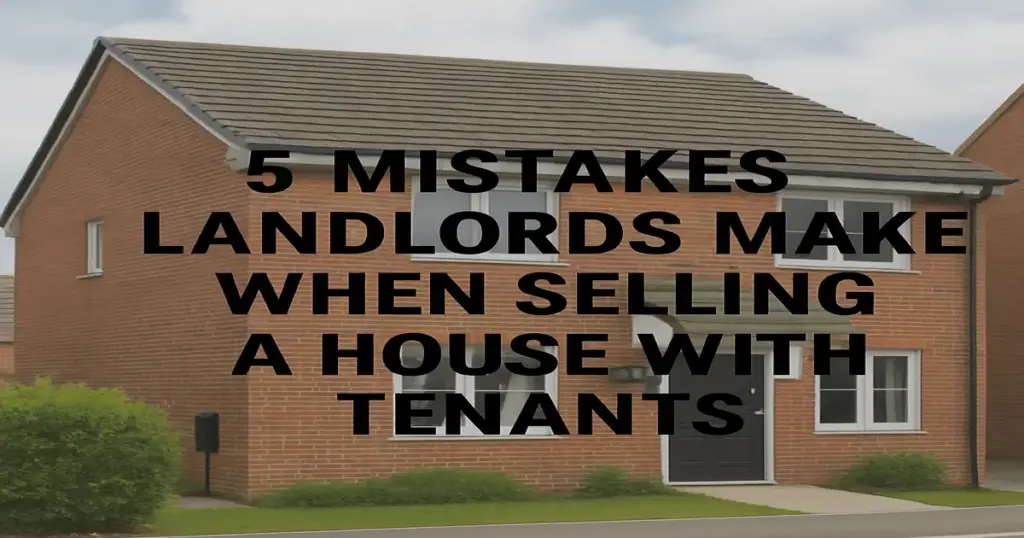5 Mistakes Landlords Make When Selling a House with Tenants in the UK
Selling a rental property is a significant decision for any landlord, but the process becomes more complex when tenants are involved.
While it is entirely legal to sell a property with tenants in situ (that is, still occupying the home), landlords often fall into several pitfalls. These mistakes can lead to delays, legal challenges, strained relationships, or reduced sale prices.
In this comprehensive guide, we’ll walk through the five most common mistakes landlords make when selling a tenanted property in the UK and how to avoid them. We’ll also add frequently asked questions to help you navigate the process smoothly and legally.
Mistake 1: Failing to Communicate Transparently with Tenants
One of the landlords’ most common and damaging mistakes is failing to keep tenants informed. Legally, a landlord is not required to obtain a tenant’s permission to sell property, but this doesn’t mean it cannot be avoided.
Why It’s a Mistake: Lack of communication can foster distrust, anxiety, and even resistance from tenants. If they become uncooperative, feel blindsided by the news, or are uncertain about their future, they can affect viewings, property presentation, and overall buyer interest.
What to Do Instead:
Open communication is key. Inform tenants of your intention to sell before placing the property on the market. Explain clearly in the lease what the sale means for them and their tenancy agreement.
If they are on an assured shorthold tenancy (AST), clarify whether they are expected to remain or vacate. Offering reassurances about their rights and timelines can improve their experience, as they do not know the type of tenancy in place.
Understanding the type of tenancy agreement in force is critical when selling a property with tenants. Many landlords proceed with the sale without fully grasping the implications of the legal agreement currently in place.
Why It’s a Mistake: Different tenancy agreements grant tenants varying levels of rights and protection. Misunderstanding these rights can lead to legal disputes or delays in the sale.
For instance, tenants with a rolling periodic tenancy are easier to evict than those on a fixed-term tenancy, where they have a right to remain until the end of the term unless they breach the contract.
What to Do Instead:
Review the tenancy agreement carefully. Determine if it is a fixed-term or periodic tenancy. Consult a legal professional if needed to understand the obligations and timelines involved. If your tenant is in a fixed-term agreement, you may need to wait until it expires unless they agree to leave early.
Additionally, check if the tenancy is protected by the Rent Act 1977 or if it’s an assured tenancy, which provides more long-term security to tenants than an AST.
Mistake 3: Marketing the Property Without Considering Tenant Rights
Another error is placing the property on the market and arranging viewings without considering tenant consent or notice requirements. Under the Housing Act 1988, tenants have the right to “quiet enjoyment proper”.
Why it’s a Mistake: It’s Seducing. Seducing without proper notice or consent can breach tenancy laws and lead to tenant complaints or legal action. This also creates unnecessary tension and may lead to tenants intentionally sabotaging viewings.
What to Do Instead:
Always provide tenants with at least 24 hours’ written notice before viewing and secure their agreement beforehand. Ideally, you should agree on specific days and times for viewings to minimise disruption. Incentivising, offering an incentive, such as a rent reduction or a gift card, may encourage cooperation.
Some landlords wait until the property is vacant before putting it on the market to avoid these complications. However, selling with tenants in place can be beneficial or income-producing.
Mistake 4: Ignoring the Impact on Market Value and Buyer Type
Many landlords fail to understand how a tenanted property affects the potential buyer pool and the property’s mark-to-market. Selling tenants in situ often appeals only to other investors, not owner-occupiers.
Why It’s a Mistake: It’s the tenant. If the tenant stays, it limits the buyer market to those who want a rental property, which could affect both the sale price and how long the property stays on the market. Additionally, if tenants are uncooperative or the property is untidy, it can be more challenging to attract tenants instead:
Understand your buyer profile. If your goal is to sell to an investor, highlight the rental yield, length of tenancy, and quality of tenant. Provide evidence of timely rent payments and maintenance records to build confidence.
If you wish to appeal to a broader buyer base, consider waiting until the tenant leaves, especially if the tenancy is near its natural end. An empty property may achieve a higher price due to increased appeal to owner-occupiers.
Mistake 5: Not Serving the Correct Notices or Following Legal Process
Perhaps the most damaging mistake a landlord can make is attempting to remove tenants improperly to facilitate the sale. This can include serving the wrong notice or attempting informal evictions.
Why It’s a Mistake: Not serving notice promptly can invalidate the eviction process. This can result in costly delays and legal disputes, especially if the case goes to court. In the UK, landlords must follow specific procedures under Section 21 or Section 8 of the Housing Act 1988.
Additionally, with recent legal changes, including the Renters (Reform) Bill and challenges with no-fault evictions, navigating the legal framework is more complex than ever.
What to Do Instead:
Ensure all legal procedures are strictly followed. If you plan to use a Section 21 notice to regain possession, check that all compliance conditions have been met: valid gas safety certificates, deposit protection, and the provision of the ‘How to Rent’ g’ide, among ‘guide, among othersre in breach of contract (e.g., rent arrears or property damage), a Section 8 notice may be appropriate, but this has different evidentiary requirements. Hiring or using a professional eviction service is highly recommended to ensure all steps are lawful and procedurally sound.
Conclusion
Selling a tenanted property in the UK involves more than just putting a house on the market. Landlords must juggle legal obligations, tenant relationships, and marketing strategy to ensure a successful sale.
By avoiding these five key mistakes—lack of communication, ignorance of tenancy types, disregarding tenant rights, misunderstanding market dynamics, and mishandling legal processes—you’ll be far more likely to place property efficiently and lawfully.
Frequently Asked Questions
Can I sell my house with tenants in it?
Yes, you can sell a property with tenants in situ. Many buy-to-let investors specifically look for tenanted properties. However, you must ensure you understand the terms of the existing tenancy and communicate with your tenants appropriately.
Do I have to tell the tenant I’m selling the property? Although there is no legal requirement to notify tenants before listing the property, it is considered best practice. Open communication often results in greater cooperation during the sale prosales.
What happens to the tenancy when I sell the property?
The tenancy agreement remains legally binding, even after the sale. The new owner takes over the landlord’s responsibilities and must honour the terms of the existing tenancy unless the tenant agrees to leave or is evicted through proper legal channels.
Can I evict a tenant to sell the property?
You can serve a Section 21 notice (currently still in use, pending the Renters Reform Bill becoming law) to regain possession, provided you follow the correct legal procedure. Alternatively, a Section 8 notice can be used if the tenant has breached their agreement. However, evicting a tenant solely for the purpose of selling can be legally and ethically complex.
Will having tenants affect the sale price?
Yes, selling with tenants may reduce the sale price or limit your buyer pool to investors only. However, if the tenants are reliable and the rental yield is strong, tit can aitact active turnkey keyinvestkey investment the tenant refuses to allow viewings?
Tenants have the right to quiet enjoyment and can legally refuse viewings, especially if not properly notified. Landlords must give at least 24 hours’ written notice and a reasonable time for access. Pressuring or entering without consent can be deemed harassment or trespass.
Do I need to return the tenant’s deposit? The tenant’s deposit remains protected in a government-approved tenancy deposit scheme. When the property is sold, the deposit protection can be transferred to the new landlord, who assumes responsibility.
What legal documents do I need to provide a buyer?to
Buyers will typically require:
A copy of the tenancy agreement
Deposit protection certificate
Gas safety certificate
Energy Performance Certificate (EPC)
Evidence of compliance with landlord obligations (e.g., How to Rent guide)
Having these documents ready can speed up the transaction.
Can I sell to my tenant directly?
Yes, and this can be a mutually beneficial arrangement. If the tenant is interested in buying, it avoids the need for marketing, viewings, and potential vacancy. Make sure to obtain an independent valuation and legal advice.
What if the tenant stops paying rent during the sale?
This can complicate the sale and may impact the buyer’s interest. If the buyer falls into arrears on the amount owed, you may issue a Section 8. Professional legal guidance is recommended.
Selling a property with tenants doesn’t have to be a nightmarish process. With proper planning and communication, it can be a smooth and even profitable process. Whether you’re selling your property or your business, taking proactive steps will help you avoid common pitfalls and maximise your sale outcome.
Useful Links
Gov.uk – Private Renting: Evicting Tenants
https://www.gov.uk/evicting-tenants
The official government page explains the process for serving Section 21 and Section 8 notices, plus court procedures.Shelter England – Tenancy Rights and Eviction
https://england.shelter.org.uk/housing_advice/eviction
Useful to understand the rights of tenants and the legal limits of landlord actions.Citizens Advice – Eviction and Rent Arrears
https://www.citizensadvice.org.uk/housing/renting-a-home/eviction
Provides balanced guidance on eviction rules and when landlords can legally act.
Read our top Blogs:
Sell My Property Fast For Cash In Wandsworth
What to Do If Your House Won’t Sell: Fast Solutions That Work
How to Sell a House Fast: Proven Tips to Get a Quick Sale Without Estate Agents






